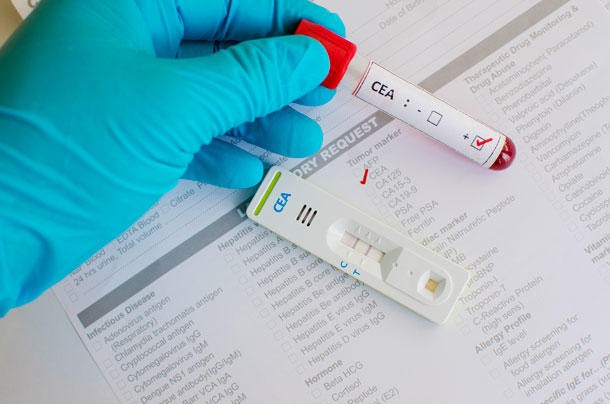
Contents
Can Cancer Be Detected by a Blood Test?
If a physician suspects cancer during an examination or medical history, they might order cancer blood tests known as tumor markers. These tests can provide some information about the origin of cancer and its response to treatment, but they are not specific or highly sensitive.
Other blood tests can give a general idea about the functioning of organs and whether they have been affected by cancer.
What Blood Tests Detect Cancer?
Tumor marker tests
Tumor markers are chemicals produced by cancer cells and found in the blood. However, they can also be produced by normal cells, resulting in elevated levels in noncancerous conditions. Some examples of tumor markers include:
- Prostate-specific antigen (PSA) for prostate cancer
- Cancer antigen-125 (CA-125) for ovarian cancer
- Calcitonin for medullary thyroid cancer
- Alpha-fetoprotein (AFP) for liver and testicular cancer
- Human chorionic gonadotropin (hCG) for germ cell tumors
- Carcinoembryonic antigen (CEA) for colon cancer
- Human epididymis protein 4 (HE4) and inhibin for ovarian cancer
Circulating tumor cell tests
New blood tests can detect tumor cells that have separated from the original cancer site and are circulating in the bloodstream. These tests are not commonly used in clinical settings yet.
Blood protein testing
Electrophoresis examines various proteins in the blood to identify elevated immunoglobulins seen in multiple myeloma. A bone marrow biopsy can confirm the diagnosis of blood cancer.
Complete blood count (CBC)
A CBC helps diagnose blood cancers, detect bone marrow invasion, evaluate a person’s response to cancer treatment, and diagnose noncancerous conditions.
- Low white blood cell count: Cancer treatment and leukemia can lower white blood cell count.
- Low red blood cell count: Chemotherapy, radiation, and bleeding from stomach cancer can decrease red blood cell count.
- Abnormal lymphocytes or monocytes: Indicate the possibility of certain cancers.
- Low platelet count: Bone marrow-affected cancer can lower platelet count.
A bone marrow biopsy may help confirm the diagnosis of blood cancer.
Urinalysis
Urinalysis examines urine for various cells and chemicals. Blood in the urine can be a benign condition or indicate other problems.
Other blood tests include:
- Alkaline phosphatase: Helps diagnose liver and bone cancer.
- Ferritin: Elevated levels may indicate Hodgkin’s disease or leukemia.
- Thyroglobulin: Elevated levels may indicate follicular cancer.
Is There a Blood Test for Colon Cancer?
No blood test specifically detects colon cancer. However, a blood test measuring carcinoembryonic antigen (CEA) can help understand the treatment outlook and if the cancer is responding to treatment. This test is not specific to colon cancer and may also be negative for other types of colon cancer.
While a promising blood test for colon cancer is being researched in Taiwan, it is not yet available in the U.S.
What Is Polycythemia Vera?
What Types of Screening Methods Detect Colon Cancer?
Fecal occult blood test (FOBT)
A fecal occult blood test (FOBT) checks the stool for blood. Blood in the stool can be an early sign of colon cancer or indicate other noncancerous conditions. There are two types of FOBTs:
- Guaiac FOBT: A chemical test that changes color if blood is present in the stool.
- Immunochemical FOBT: Detects blood in the stool using antibodies and a machine.
Cologuard
Cologuard combines a FIT test with a DNA test to detect existing colon cancer or advanced precancerous polyps.
Colonoscopy
- Observes the inside of the colon for signs of colon cancer.
- Involves inserting a colonoscope into the rectum and colon to remove polyps for further testing.
Computed tomography (CT) colonography
- Produces detailed images of the entire colon using CT technology to identify abnormalities.
- A non-therapeutic diagnostic test that requires further examination for the removal or sampling of abnormal lesions.
Flexible sigmoidoscopy
- Limited colonoscopies that examine only the left side of the colon.
- Can remove polyps and take biopsies.
Barium enema
- X-rays of the lower gastrointestinal tract using a barium solution.
- Also known as the lower gastrointestinal series.


